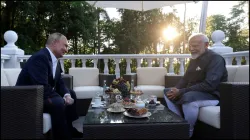Why did PM Narendra Modi choose Russia for first bilateral visit after NDA 3.0?
Prime Minister Narendra Modi arrived in Moscow for his first bilateral visit to Russia in nearly five years and his first since the Russia-Ukraine war. He and Russian President Vladimir Putin will participate in the 22nd India-Russia annual summit on Tuesday to discuss key issues.

Prime Minister Narendra Modi is currently on a two-day visit to Russia after giving the recent Shanghai Cooperation Organisation (SCO) Summit in Kazakhstan a miss. This visit is significant as it is his second foreign trip and first bilateral tour after taking the helm of the National Democratic Alliance (NDA)-led Indian government for a record third term, and it also comes in the backdrop of the Russia-Ukraine war.
India has long-standing relations with Russia that date back to the time of the Soviet Union in the Cold War period, when the USSR was the main supplier of defence equipment in the face of US hostility. Even today, as a mark of India's relationship with Russia, New Delhi has refused to condemn Moscow's invasion of Ukraine and has repeatedly called for diplomacy and dialogue to resolve the conflict, a sign of its delicate diplomatic position.
Another point to be noted is the bonhomie between PM Modi and Russian President Vladimir Putin, who have met each other 17 times in the last 10 years. Putin warmly received PM Modi as a "dear friend" at his official residence in Novo-Ogaryovo on Monday, and congratulated him on his re-election and complimented his energetic relationship. Even in the past, Putin has been full of praise for the Indian leader for his strong leadership in defending India's national security interests. This praise has been reciprocated by PM Modi as well, as he lauded the Kremlin leader for strengthening the bilateral relationship for over two decades.
Why India chose Russia for PM Modi's first bilateral visit?
There are multiple reasons as to why the Indian Prime Minister would choose Russia for his first bilateral visit after the formation of the Modi 3.0 government. It was in 2020 during Putin's visit to India when the Strategic Partnership between New Delhi and Moscow was elevated to the level of a “Special and Privileged Strategic Partnership.” This year, PM Modi broke away from his tradition of travelling to a neighbouring country first after the government formation - Bhutan in 2014 and Maldives and Sri Lanka in 2019. This year, his first foreign visit was to Italy to attend a multilateral meeting of G7 leaders.
The decision for his first bilateral visit to Russia is in line with the significance India attaches in its relations with Russia in view of its decades-long and time-tested relationship. While India has been looking towards other countries like the United States, France and Israel for defence, it can not afford to alienate Russia, which still supplies 60 to 70 per cent of India's defence needs. It also comes amid India's growing stature as a crucial player in world politics.
India has also developed an important strategic partnership with Russia in the fields of nuclear and space cooperation. India has also resisted Western sanctions to buy Russian oil at discounted prices to curtail the inflationary impact of increasing oil prices. This has pushed bilateral trade volumes to $65.7 billion in the financial year 2023-24.
India and Russia also cooperate closely at several multilateral platforms such as the UN, G20, BRICS and SCO. Currently, New Delhi is seeking to make progress on an investment treaty with Russia as well as signing a free trade agreement with the Moscow-led Eurasian Economic Union. Russia is also a crucial player in India's connectivity projects, like the International North–South Transport Corridor (INSTC) and a new Chennai-Vladivostok Eastern Maritime Corridor.
What will India and Russia discuss?
The two leaders will hold official talks on Tuesday, with the economic agenda, including issues of energy and trade, along with the peaceful settlement of the Russia-Ukraine conflict to be the main focus of the interaction, sources told TASS news agency. "The focus of the visit is on the economic agenda, including issues of energy, trade, production, and fertilisers, as well as on the settlement [of the conflict in Ukraine], which cannot be reached on the battlefield," the sources said.
According to the special briefing of the Ministry of External Affairs held on July 5, Foreign Secretary Vinay Kwatra said the two leaders will hold a closed-door "restricted-level talk", which will be followed by delegation-level talks led by PM Modi and Putin. PM Modi will likely express that "a solution can't be found on the battlefield" regarding the ongoing Ukraine conflict, sources indicate. This stance aligns with India's long-standing viewpoint, emphasising diplomatic resolutions over military engagements.
India also aims to address the trade imbalance with Russia, exacerbated by increased energy imports. Proposals will be presented to enhance trade in consumables, pharmaceuticals, consumer goods, and services, along with digital space opportunities. Additionally, India will strongly raise the issue of Indian nationals recruited into the Russia-Ukraine conflict, seeking their expeditious discharge.
PM Modi's talks with Putin will also focus some new areas of scientific and technological research that will yield 'tangible' outcomes, said Indian Ambassador to Russia Vinay Kumar. The annual summit between the prime minister of India and the president of Russia is the highest institutional dialogue mechanism in the strategic partnership between the two countries. So far, 21 annual summits have taken place alternately in India and Russia.
ALSO READ | PM Modi addresses Indian diaspora in Russia, says 'world is surprised to see pace of India's growth'

